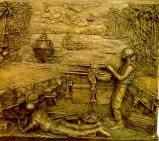Bob Brewin, who writes "Whats Brewin" for Nextgov mostly on military and veterans issues, has a great short piece at that site about the Zumwalt family.
Brother Enemy
Left to right: Elmo Zumwalt III, James "Jim" Zumwalt, and Elmo Zumwalt Jr. at a patrol boat base in Vietnam 1969. Credit: Zumwalt family photo.
For Jim, the years following the war turned out worse than the combat.
Snip
Crewman on those patrol boats experienced a high casualty rate because they operated on narrow waterways where the banks were lush with vegetation, giving the Viet Cong ample cover to ambush crews.
Zumwalt Jr., who became the youngest chief of Naval operations in 1970, decided to eliminate this natural cover by ordering the spraying of the chemical defoliant Agent Orange on the river banks patrolled by the boats of the "brown water Navy," including the one commanded by his namesake son.
That tactical decision unleashed a chemical time bomb on the Zumwalt family. Agent Orange contained carcinogens, and in 1983, Zumwalt III was diagnosed with lymphatic cancer, a result of his exposure to Agent Orange, he later wrote.
Zumwalt III died in 1988, but not before he co-authored with his father the book "My Father, My Son", a tale of generational military service that dates back to the American Revolution and courage in the face of adversity.
Today, Jim Zumwalt has weighed in with his own book, "Bare Feet, Iron Will Stories from the Other Side of Vietnam's Battlefields", a courageous story of our enemies in Vietnam. The book will have its formal launch at noon on April 26 at the Navy Memorial in Washington. (The Navy Memorial has a bas-relief that features PCF-35, the patrol boat commanded in Vietnam by Zumwalt III.)
Inland Engagements - U. S. Navy River Operations - Vietnam
I write courageous because it treats the enemy we faced in Vietnam with understanding and sympathy, a take Jim told me that he feared would arouse the wrath of some Vietnam veterans who have yet to come to terms with the war.
But, as Jim told me and as he relates in his book, by meeting his enemy, he started the process of healing his anger and grief, especially over the loss of his brother.
In 1994, Jim accompanied his father on a trip to Hanoi to provide Vietnamese veterans of the war with artificial limbs and wheelchairs. On that trip, Jim watched his 73-year-old father lift and then place a legless Vietnamese veteran in a wheelchair. At that moment, Jim realized that his father had "an immense compassion . . . for those who were less fortunate, whether friend or foe." -->-->-->


No comments:
Post a Comment